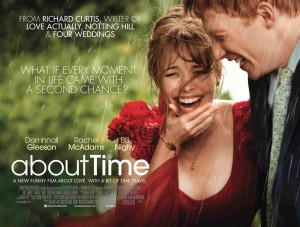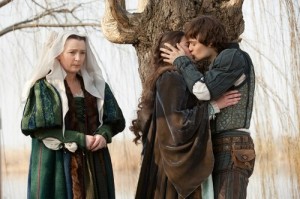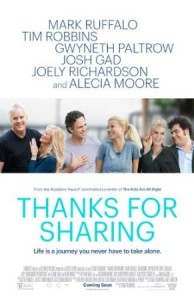About Time
Posted on October 31, 2013 at 6:00 pm
B+| Lowest Recommended Age: | Mature High Schooler |
| MPAA Rating: | Rated R for language and some sexual content |
| Profanity: | Very strong and crude language |
| Alcohol/ Drugs: | Drinking and substance abuse |
| Violence/ Scariness: | Sad death, scary car crash |
| Diversity Issues: | None |
| Date Released to Theaters: | November 1, 2013 |
| Date Released to DVD: | February 3, 2014 |
| Amazon.com ASIN: | B00BEIYGK2 |
 Richard Curtis perfected the art of the 21st century romantic comedy in “Four Weddings and a Funeral,” “Notting Hill,” and “Love Actually.” They were witty and sophisticated and had posh British accents that made them seem twice as witty and sophisticated. They were filled with of pretty people wearing pretty clothes in pretty settings, seasoned with self-deprecating humor, magnificent friendships, pop-y soundtracks, and happy ever after endings. “About Time” has all of that, plus a twist. I don’t mean the addition of a fantasy time travel element, thought that is something of a departure. The real twist is that the important love story here is not between man and woman but between father and son.
Richard Curtis perfected the art of the 21st century romantic comedy in “Four Weddings and a Funeral,” “Notting Hill,” and “Love Actually.” They were witty and sophisticated and had posh British accents that made them seem twice as witty and sophisticated. They were filled with of pretty people wearing pretty clothes in pretty settings, seasoned with self-deprecating humor, magnificent friendships, pop-y soundtracks, and happy ever after endings. “About Time” has all of that, plus a twist. I don’t mean the addition of a fantasy time travel element, thought that is something of a departure. The real twist is that the important love story here is not between man and woman but between father and son.
Oh, there’s a romantic love story, of course, and it’s the part that’s featured on the poster. Tim (Domhnall Gleeson, son of the Irish actor Brendan Gleeson and best known as one of the Weasley brothers in the “Harry Potter” films) lives in Cornwall with his family, a blissfully happy group that includes his slightly starchy mother (Lindsay Duncan), slightly dotty but impeccably dressed uncle (Richard Cordery), wild child of a sister (Lydia Wilson), and book-loving, family-loving dad (the indispensable Bill Nighy). Dad explains to Tim that the men in their family have the ability to travel through time. There are limits, of course. Like “Quantum Leap,” he is limited to his own lifetime. He can’t go back and meet Queen Victoria or ride a dinosaur. And, as Tim will spend the rest of the movie discovering, while he can go back to correct a mistake, the ripple effect of even the tiniest change may have very big consequences that are not so easy to fix.
It may sound all very precious and cutesy, and it is, with Curtis’ trademark adorable eccentrics that are less adorable than he intended. Even an English accent can only make up for so much. Tim’s use of his time travel powers to make up for various gaffes is entertaining in a “Groundhog Day”-lite sort of way. (There’s something rather meta about a feeling of deja vu in these repeated, slightly improved encounters.) The romance between Tim and a pretty American named Mary (Rachel McAdams), while refreshingly free of the kinds of agonizingly silly misunderstandings that plague most romantic comedies, is on the bland side. The first meeting with Mary’s parents is supposed to be awkward and funny, but it’s just awkward. Things get more interesting later, as Tim and Mary get married and start a family. The stakes are higher and the choices are more complex.
It is in the third act when things start to get interesting, because that is when the focus shifts to the father-son relationship. Curtis, who says this is his last film, opens up his heart for a piercingly bittersweet engagement with the big questions of who we are, making peace with not being able to fix everything for everyone we love, and finding a way to make pain and loss deepen us.
Parents should know that this film includes sexual references, some explicit, and some sexual situations, very strong and crude language, car accident, and a sad death.
Family discussion: If you could go back in time, would you correct a mistake or take time to enjoy what already happened? Why did Kit Kat have such a hard time making good decisions? Was there anything her family should have done differently to help her?
If you like this, try: “Four Weddings and a Funeral” and “Love Actually” from the same writer/director and “Groundhog Day”




